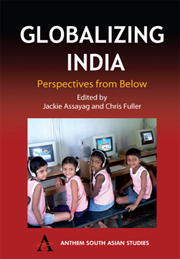Book contents
- Frontmatter
- Contents
- List of Contributors
- Acknowledgements
- 1 Introduction
- Part One Economy and Agriculture
- 2 On the History of Globalization and India: Concepts, Measures and Debates
- 3 In Search of ‘Basmatisthan’: Agro-nationalism and Globalization
- 4 Seeds of Wrath: Agriculture, Biotechnology and Globalization
- 5 Weaving for IKEA in South India: Subcontracting, Labour Markets and Gender Relations in a Global Value Chain
- Part Two Education and Language
- Part Three Culture and Religion
- Bibliography
2 - On the History of Globalization and India: Concepts, Measures and Debates
from Part One - Economy and Agriculture
Published online by Cambridge University Press: 05 March 2012
- Frontmatter
- Contents
- List of Contributors
- Acknowledgements
- 1 Introduction
- Part One Economy and Agriculture
- 2 On the History of Globalization and India: Concepts, Measures and Debates
- 3 In Search of ‘Basmatisthan’: Agro-nationalism and Globalization
- 4 Seeds of Wrath: Agriculture, Biotechnology and Globalization
- 5 Weaving for IKEA in South India: Subcontracting, Labour Markets and Gender Relations in a Global Value Chain
- Part Two Education and Language
- Part Three Culture and Religion
- Bibliography
Summary
Introduction: A Problematic Category
Over the last decade, globalization has become the great shorthand description for a vast variety of social and economic processes in almost every part of the world. It is deployed to explain phenomena as diverse, often contradictory, and in a few instances also long-lived, as poverty, unemployment, environmental degradation, decline in public health and education, reduction in social spending and welfare measures, caste-based, religious or other forms of social violence, terrorism, the recrudescence of nationalism, and the loss of national sovereignty to market forces and international institutions. It is a ‘hegemonic category’ in that, although used in a staggering variety of ways and for diverse ends, both protagonists and critics alike usually take the term for granted and its meaning as self-evident. Three quite recent scholarly volumes on globalization open identically by describing the term either as a ‘catchword’ or a ‘cliché’ or both.
Yet scholars in the humanities and the social sciences feel irresistibly drawn to it: according to A. G. Hopkins, justifying his own venture into the area, and deprecating the reluctance of historians to even ‘recognize the subject’, ‘the analysis of the origins, nature, and consequences of globalization [is] (…) currently the most important single debate in the social sciences’.
According to a widely cited definition, globalization refers to the ‘widening, deepening, and speeding up of worldwide interconnectedness in all aspects of contemporary social life, the cultural to the criminal, the financial to the spiritual’.
- Type
- Chapter
- Information
- Globalizing IndiaPerspectives from Below, pp. 17 - 46Publisher: Anthem PressPrint publication year: 2005
- 2
- Cited by



